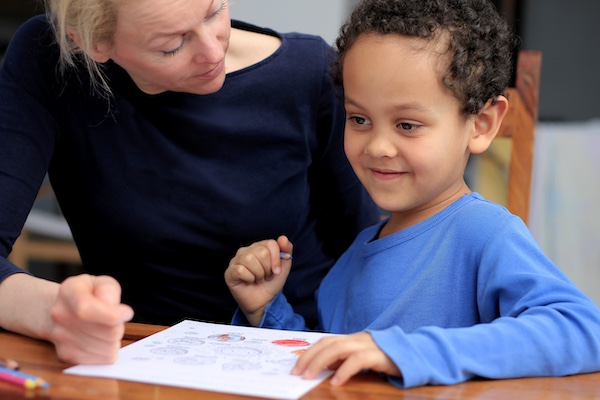Social interactions shape our lives from the moment we’re born, but the ability to connect with others doesn’t come naturally to everyone. For children diagnosed with Autism Spectrum Disorder (ASD), developing social skills often requires intentional teaching and modeling. These skills are typically introduced by peers and the adults involved in a child’s life. Since many children aren’t diagnosed with autism until their toddler years, it’s essential to begin modeling social behaviors from the earliest stages of life.
From waving hello to sharing a toy, everyday gestures and interactions may seem automatic to most people. However, children with autism often need extra support to learn and practice these behaviors. Early and intentional socialization is key to helping children with autism navigate the social world with confidence.
Debunking the Myth of Social Disinterest
One common misconception is that children with autism lack the desire to connect with others. However, research from Cambridge University in 2018 highlights that most children with ASD want to engage socially-they simply face challenges in doing so. Behaviors like avoiding eye contact, struggling with nonverbal cues, or isolating themselves during play often stem from difficulties in interpreting social signals rather than a lack of interest.
Social anxiety can also act as a barrier. Children with autism may avoid interactions due to fear of rejection or misunderstanding, which can reinforce patterns of solitary behavior. Overcoming these challenges requires patience, persistence, and a commitment to creating safe and supportive social experiences.
Recent Posts
- Navigating the Holidays with Your Autistic Child: A Guide for Parents
- Essential Reading for Parents of Autistic Children: A Verified Guide
- Real Families, Real Results: Why AG Behavioral Services Is Transforming Lives Through ABA Therapy
- Understanding Autism in 2025: New Data Reveals Rising Prevalence and Changing Demographics
- “Respond and Expand”: A Simple Way to Boost Communication in Children with Autism
Strategies to Promote Social Growth
Parents and caregivers play a pivotal role in nurturing a child’s social development. By actively teaching and modeling social behaviors, you can help your child develop emotional regulation, improve communication, and build confidence. Here are some practical strategies to get started:
1. Peer-Mediated Interventions
Encouraging interactions with peers is one of the most effective ways to foster social skills. Siblings, friends, or classmates can model behaviors like sharing, turn-taking, and cooperation. Activities such as building a sandcastle, playing catch, or working on a puzzle together provide natural opportunities for social learning. Teachers and parents can help by setting up these scenarios and staying nearby to offer guidance.
2. Social Stories
Social stories introduce children to new social norms or experiences in a structured, engaging way. These short narratives are personalized to address specific social situations and help children understand what to expect. For example:
“My toys belong to me. They are mine.
Some of my toys have my name on them.
I may play with my toys or share them with someone.
I have toys that are mine.”
By relating to a child’s personal experiences, social stories can be a powerful tool for teaching and reinforcing positive behaviors.
3. Role-Playing
Role-playing allows children to practice social scenarios in a low-pressure environment. Whether structured or spontaneous, these exercises can help children develop confidence in social settings. For example, a parent might act as a cashier while the child practices making a purchase. Over time, children become more comfortable initiating and sustaining conversations.
4. Identifying Real-Time Emotions
Helping children recognize emotions in others is essential for successful social interactions. Parents and teachers can point out emotional cues during everyday situations, saying things like, “Look, Sally is smiling-she’s happy!” Acknowledging and labeling positive social behaviors, such as sharing or cooperating, also encourages children to imitate these actions.
5. Community Social Opportunities
Getting out into the community provides children with real-world practice in diverse social settings. Libraries, parks, and shopping centers are excellent places to encourage interaction with peers and navigate sensory experiences. As a parent, modeling social engagement-such as introducing yourself to other parents or explaining your child’s needs-can help create a welcoming environment for your child.
The Role of Fun in Socialization
Children are more likely to embrace social interactions when they’re framed as enjoyable experiences rather than tasks. By incorporating play, creativity, and exploration, you can make socialization a positive part of your child’s daily life.
The Next Step: ABA Therapy
While these strategies are effective for fostering social growth, some children may benefit from additional support. Applied Behavior Analysis (ABA) therapy is a proven method for teaching social, communication, and academic skills to children with autism. ABA focuses on measurable progress, offering personalized interventions that help children build critical skills over time.
For young children in the early intervention age range, ABA therapy can lay the foundation for success in kindergarten and beyond. With many insurance plans now covering up to 40 hours of therapy per week, ABA is more accessible than ever, making it a valuable resource for families.
Supporting Lifelong Social Development
Social skills are a cornerstone of life, but learning them takes time, patience, and practice-especially for children with autism. By combining intentional strategies with professional support, you can help your child navigate the social world with confidence, setting them up for a lifetime of meaningful connections and achievements.
AGBS provides ongoing care for children, adolescents, and young adults with autism to improve the quality of their lives. If you would like learn more about how AGBS can help please contact us here , or call 908-913-0443.




